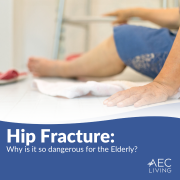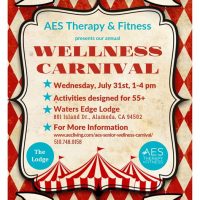Hip Fractures and What They Mean for the Elderly
There was a time when it might have been laughable, a notorious commercial from the 90s where an alert company was called via pendant by a deeply distraught lady with a thick Jersey accent, stating, she had fallen and could not get up. Of course, now we know that:
- these companies actually save lives every day, and
- the root cause of why our lady was in distress, was due to a horrible and seriously painful hip fracture or shattered pelvis.
But why is it such a persistent problem and often one of the most dangerous and life-threatening problems our elderly loved ones?
In many cases, mom or dad is usually living alone long after their spouse has passed on. Maybe they’re watching their pennies, since that’s how they were raised. It could be they’re on a fixed income. Maybe they’re not eating as well as they should, or not taking the supplements they need because they forgot them. And thus, the seeds of osteoporosis are planted. It’s possible there are other contributing factors, such as Parkinson’s, persistent foot ailments, poor/bad vision, lightheadedness, circulatory ailments, or just persistent injuries that take longer and longer to heal. But not only is a hip fracture a serious injury in of itself, it means that there’s already a whole host of issues present contributing to the fall.
Dr. Andrew Ow, a geriatrician at Drexel Medicine, talks about how hip fractures are merely an indicator of a serious set of conditions that have led to the fall.
As you can see, the fall and resultant injury itself is only the tip of the iceberg for what it means to have a fall, but why is it so deadly for our seniors?
A fall is the start of a decline in health for the senior in question.
When a senior falls, they are usually bedridden for a number of weeks until their bones can heal, either that or they are confined to a wheelchair. This, in turn, lessens their ability to care for themselves and without mobility and exercise their decline becomes more pronounced, their bones and muscles atrophy and their ability to take on vital nutrients diminishes. An elderly person has to try very hard to want to come out of that wheelchair or bed.. and in most cases, the person never loses the ability to walk without aid, such as with a walker or cane. In some rare cases, the person does recover from a fall without any walking aids, but it is only with months of hard work in physical therapy.
If a senior falls alone without help, the results can be fatal.
The sad fact is without a pendant, or home health, without friends and family, or at least a friendly visitor, a fall can be fatal because the senior is unable to get up on their own. This means they essentially remain glued to the floor by gravity. We’ve seen seniors spared in the nick of time because a neighbor noticed the piles of papers outside and called the police for a wellness check. In their own kitchen, next to a freshly made meal, with a fridge full of food, and a cellphone on a counter the fallen senior slowly became more and more dehydrated.
If a break is bad enough, the bones may sever arteries.
Due to the nature of why people fall, certainly circulatory issues my one of them and it may be one of the contributing factors of the fall. A person with a history of heart problems, stroke, or heart disease may be prescribed blood thinners that help with these ailments but also prevent the blood from clotting. If a person has a compound fracture (bones protruding outside the skin), or severs even a minor internal artery, they may bleed profusely without stopping, losing a very great amount of blood before any help arrives at all.
The reasons why a fall can be deadly are many, but how do we prevent this?
Well one of the reasons why we stress diet and exercise is because it is a bit of preventative medicine we can do to make sure we are healthy enough to avoid falling. Diet and exercise impact everything. Eating right gives the you the right building blocks. With the right building blocks, your muscles become strong enough to support your weight more effectively; and exercise provides the training needed for that support. With that in mind, our major goals and our focus for our facilities is good food, activities, and physical therapy. Medication can only relieve the symptoms of an ailment, with dedication, encouragement, good nutrition, and good exercise these can be a great step towards alleviating a number of the causes of the symptoms.



